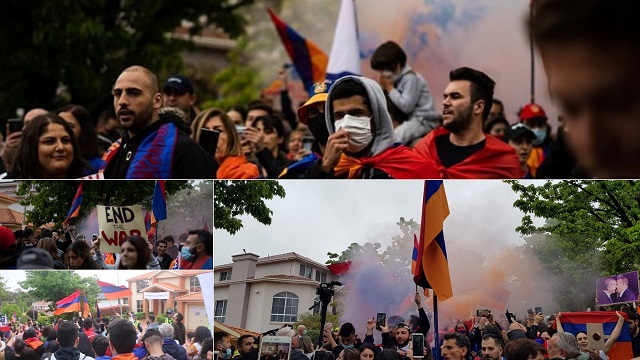CANBERRA: Around 500 Armenian-Australians travelled from Sydney to Canberra to protest Baku’s attacks on the Republics of Artsakh and Armenia at the Embassy of Azerbaijan attracting mass media coverage, reported the Armenian National Committee of Australia (ANC-AU).
On 27th September 2020, Azerbaijan – backed by Turkey-funded Islamist jihadist mercenaries and air support – began large-scale military assaults along the entire length of their border with Artsakh, something the international community and media have by and large failed to adequately condemn in favour of Baku’s preferred false parity narrative that lays equal blame on both sides.
The Australian Government’s reaction was one of the many things addressed at the Armenian community’s protest, organised by the Armenian Youth Federation of Australia (AYF-AU). Speakers called out Baku’s dictatorship led by Ilham Aliyev and Turkey’s dictator Recep Tayyip Erdogan for attempting another wipe-out of Armenians like their Ottoman forebears did in the Armenian, Assyrian and Greek Genocides of 1915.
Protestors also called on the Australian Government to end their position of “sitting on the fence”, which is contrary to the reality on the ground and helping enable the twin dictatorships to commit war crimes while bombing civilian targets in the self-determined Republic of Artsakh that is indigenous to Armenians.
Read also
The Guardian was one of dozens of publications that covered the protest through the newswire service of the Australian Associated Press.
“Canberra can’t sit on the fence as hundreds of innocent peace-loving indigenous Armenians are being bombed to their deaths.”
Vache Kahramanian drew a comparison with the Armenian Genocide.
“This is not new, unfortunately, to Armenian people. We’ve lived through this before. People are fearful for their lives,” Kahramanian said.
Kayserian added: “The Armenian genocide was based on expansionism, was based on faith, was based on nationality, and what we’re seeing here are those same ingredients.”
The coverage correctly referred to Artsakh as “indigenous Armenian territory”, features the use of cluster bombs as “war crimes” in Artsakh’s capital Stepanakert and articulates that Armenian-Australians “want the Australian government to join France in condemning Turkey and Azerbaijan”.
SBS and ABC television ran pieces on the protest in their national primetime bulletins, while the radio stations of both networks also covered the Armenian-Australian protestors’ concerns.
The winner of the inaugural The Voice Armenia in 2013, and semi-finalist on The Voice Australia in 2020, Masha Mnjoyan sang an emotional tribute to Armenian soldiers fighting to keep Armenia’s and Artsakh’s borders secure, while the talented Raffy Adourian also performed for what was a loud but peaceful crowd, which included leaders from the Assyrian-Australian and Greek-Australian communities.
“This is only the start,” said organiser and Chair of the Armenian Youth Federation of Australia, Aram Tufenkjian. “As long as Artsakh and Armenia are under attack, and their sacrifice is not being accurately reflected in public, we will demonstrate and support our soldiers and compatriots in the country of our origin.”
“We will change, adapt and create any type of awareness activities needed in order to get our message across,” Tufenkjian added.




















































